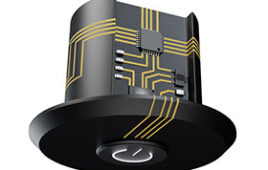The concept of 4D printing is certainly not new, but researchers at the Lawrence Livermore National Laboratory in California have demonstrated the 3D printing of shape-shifting structures that can fold or unfold to reshape themselves when exposed to heat or electricity.
The micro-architected structures were made from a conducive, environmentally responsive polymer ink developed at the lab.
Lab scientists and engineers at the laboratory developed a strategy for creating boxes, spirals, and spheres from shape memory polymers, bio-based smart materials that exhibit shape-changes when resistively heated or when exposed to the appropriate temperature.
These researchers combined the process of 3D printing and origami-style folding with conducive smart materials to establish complex structures.
In a research paper published in Scientific Reports, the team described creating primary shapes from ink comprised of soybean oil, co-polymers, and carbon nanofibers and programming them into a temporary shape at an engineered temperature, determined by chemical composition. The shape-morphing effect was induced by ambient heat or by heating the material with an electrical current, which reverts the part’s temporary shape to its original form.
“It’s like baking a cake,” said Jennifer Rodriguez, a postdoc in the laboratory’s engineering division, in a LLNL statement. “You take the part out of the oven before it’s done and set the permanent structure of the part by folding or twisting after an initial gelling of the polymer.”
The technology could have applications in the medical field, in aerospace, and for flexible circuits and robotic devices.
Filed Under: 3D printing • additive • stereolithography, Materials • advanced




